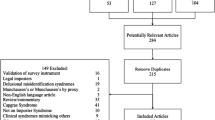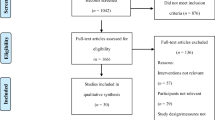Abstract
Introduction: The aim of this study was to determine whether cognitive behavioural therapy (CBT) would enhance employment outcomes in worker's compensation clients who were seeking employment. Methods: Participants were randomly assigned to a standard job search assistance group that met for 4 hours/week for four weeks, or to a group that received standard job search assistance for 4 hours/week for the first two weeks and CBT for 4 hours/week for the next two weeks. Depression, Anxiety and Stress scores were measured prior to and on completion of the intervention, and employment outcomes were assessed at four- and ten-week follow-up. Results: Affective states decreased and employment was found more rapidly after CBT than after standard job search assistance. Conclusion: These findings indicate that CBT has a useful role in the rehabilitation of people on worker's compensation who are seeking employment.


Similar content being viewed by others
References
Sullivan MJ, Feuerstein M, Gatchel R, Linton SJ, Pransky G. Integrating psychosocial and behavioral interventions to achieve optimal rehabilitation outcomes. J Occup Rehabil 2005;15:475–89.
Lancourt J, Kettelhut M. Predicting return to work for lower back pain patients receiving worker's compensation. Spine 1992;17:629–40.
Deyo RA, Diehl AK. Psychosocial predictors of disability in patients with low back pain. J Rheumatol 1988;15:1557–64.
Greenough CG, Taylor LJ, Fraser RD. Anterior lumbar fusion. A comparison of noncompensation patients with compensation patients. Clin Orthop Relat Res 1994;(300):30–7.
WorkCover Western Australia (2005) Case Activity Reports, Table 11. Retrieved June 9, 2005, from http://www.workcover.wa.gov.au.
Burns JW, Sherman ML, Devine J, Mahoney N, Pawl R. Association between workers’ compensation and outcome following multidisciplinary treatment for chronic pain: roles of mediators and moderators. Clin J Pain 1995;11:94–102.
Hadjistavropoulos HD, Craig KD. Acute and chronic low back pain: cognitive, affective, and behavioral dimensions. J Consult Clin Psychol 1994;62:341–49.
Corey D, Koepfler L, Eltin D, Day H. A limited functional restoration program for injured workers. A randomized trial. J Occup Rehabil 1996;6:239–49.
Cole JD. Psychotherapy with the chronic pain patient using coping skills development: outcome study. J Occup Health Psychol 1998;3:217–26.
Sullivan MJ, Stanish WD. Psychologically based occupational rehabilitation: the Pain-Disability Prevention Program. Clin J Pain 2003;19:97–104.
Proudfoot J, Guest D, Carson J, Dunn G, Gray J. Effect of cognitive-behavioural training on job-finding among long-term unemployed people. Lancet 1997;350:96–100.
Lovibond PF, Lovibond SH. The structure of negative emotional states: comparison of the Depression Anxiety Stress Scales (DASS) with the Beck Depression and Anxiety Inventories. Behav Res Ther 1995;33:335–43.
Crawford JR, Henry JD. The Depression Anxiety Stress Scales (DASS): normative data and latent structure in a large non-clinical sample. Br J Clin Psychol 2003;42:111–31.
Rowe H. Work Potential Profile Manual. Melbourne: The Australian Council for Educational Research, 1997.
Turner JA, Jensen MP, Romano JM. Do beliefs, coping, and catastrophizing independently predict functioning in patients with chronic pain? Pain 2000;85:115–25.
Lin EH, Von Korff M, Russo J, Katon W, Simon GE, Unutzer J, Bush T, Walker E, Ludman E. Can depression treatment in primary care reduce disability? A stepped care approach. Arch Fam Med 2000;9:1052–58.
Greenough CG, Fraser RD. The effects of compensation on recovery from low back injury. Spine 1989;4: 947–55.
Williams DA, Feuerstein M, Durbin D, Pezzullo J. Health care and indemnity costs across the natural history of disability in occupational low back pain. Spine 1998;23:2329–36.
Feuerstein M, Huang GD, Haufler AJ, Miller JK. Development of a screen for predicting clinical outcomes in patients with work-related upper extremity disorders. J Occup Environ Med 2000;42:749–61.
Valat JP, Goupille P, Vedere V. Low back pain: risk factors for chronicity. Rev Rhum Engl Ed 1997;64:189–94.
Baldwin ML, Johnson WG, Butler RJ. The error of using returns-to-work to measure the outcomes of health care. Am J Ind Med 1996;29:632–41.
Acknowledgements
We wish to thank the staff at WorkFocus Australia; in particular Ms Kirrily Manning for opportunity to conduct this research, Ms Camille Greenwell, for her support and advice, Ms Kerrie Ann Pendal for her assistance in co-ordinating the groups and Ms Adrianna Voong for secretarial assistance.
Author information
Authors and Affiliations
Corresponding author
Rights and permissions
About this article
Cite this article
Della-Posta, C., Drummond, P.D. Cognitive Behavioural Therapy Increases Re-Employment of Job Seeking Worker's Compensation Clients. J Occup Rehabil 16, 217–224 (2006). https://doi.org/10.1007/s10926-006-9024-5
Published:
Issue Date:
DOI: https://doi.org/10.1007/s10926-006-9024-5




